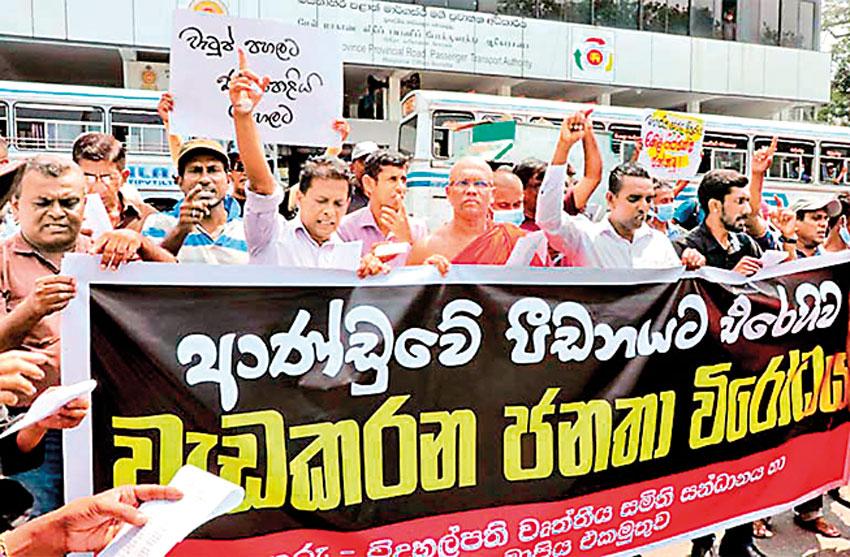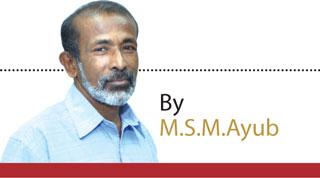18 Mar 2023 - {{hitsCtrl.values.hits}}

Wednesday’s TU strike: Success or failure?
 Wednesday’s trade union action was different from the ones the same unions launched on March 1.
Wednesday’s trade union action was different from the ones the same unions launched on March 1.
Uniformity was not an element in the previous one, as some unions struck work while others announced that they would work to rule. Employees in some State institutions demonstrated in front of their offices during the lunch hour without striking work and the impact of the trade union action was eclipsed by this diversity.
However, Wednesday’s trade union action was somewhat felt by the people. This time more unions chose to stop working with some of them declaring an indefinite strike until their demands are met.
However, unions affiliated with the Janatha Vimukthi Peramuna (JVP) announced that although they join the strike on Wednesday they would not go for an indefinite work stoppage considering the hardships faced by the people due to the economic crisis. However, JVP trade union leaders, Lal Kantha, and Mahinda Samarasinghe warned they would decide their next course of action based on the Government’s reaction to Wednesday’s strike action.
Some media institutions, including those supportive of the Government, showed the deserted railway stations and hospitals with people lamenting over them being inconvenienced and some even cursing the strikers. This might have delighted the union leaders as suffering by the people, though not meant by them is always the yardstick to gauge the success of a trade union action. And the President’s Secretariat had informed the strikers that the President was willing to discuss the demands put forward by the unions. Union leaders used this communication as well to say that the Government has “knelt.”
The JVP’s stance on Wednesday’s strike might have been called a betrayal of the ‘struggle’ had it been announced at a time when their rival leftist trade unions are powerful as in the past. However, this time names of unions affiliated with the ‘Old Left’ were not heard of. Whether the struggle was a failure or the Government knelt before the workers, it was prudent on the part of the Government to resolve the issue through negotiations, as announced.
However, it would be a gigantic task on the part of both the Government and the agitating unions to reach an agreement given the nature of the issues in question. The unions and professional associations demand, among others, a reduction of the personal income taxes that have been imposed recently on anyone earning over Rs.100,000 a month, a reduction in the bank interest rates, a reduction of recently increased electricity tariffs and the removal of obstacles for the Local Government Elections that are on the verge of being postponed for the second time due to Government’s failure to release funds.
Questions remain as to whether all unions and associations that joined the trade union action on Wednesday are in full agreement on all these demands. JVP leader Anura Kumara Dissanayake had said he proposed to move the maximum income limit for the exemption of taxes from Rs. 100,000 to Rs. 200,000. If the doctors and other high-income groups are prepared to accept that suggestion is not clear.
In fact, the moves to increase taxes, interest rates and electricity tariffs as well as restructuring some State institutions are matters that have been agreed upon by the Government and the International Monetary Fund (IMF) in relation to the global lender’s bailout package for Sri Lanka, following the country declared bankruptcy in April last year.
Unlike the past leaders of the country who hesitated to say that they accepted the conditions laid down by the IMF, President Ranil Wickremesinghe on March 7 very clearly said in Parliament that the “Government had to fulfil the requirements set by the IMF which included revision of electricity tariffs and fossil fuel prices, ensuring the independence of the Central Bank, and increasing interest rates to control inflation, reforming public enterprises, strengthening the social safety net, working to increase public revenue and controlling public expenditure.”
Out of these conditions one would be puzzled as to what the IMF has meant by social safety net as the other main conditions – increasing electricity tariff, fuel price and taxes - run counter to the idea. Electricity tariffs were increased twice after August last year by about threefold.
Obviously, the burden of increased taxes and interest rates would also be heaped ultimately on the poor. The President in his speech in Parliament expressed his Government’s determination not to change these conditions by saying “There is no room for failure in completing every task agreed upon with the IMF, unlike the previous 16 occasions.”
He indicated how difficult it was now to turn back.
“If Sri Lanka fails to fulfil the tasks agreed upon with the IMF, it could result in the IMF discontinuing its collaboration with the country, and this could in turn lead to other multilateral and bilateral financial institutions being unable to work with Sri Lanka.”
He warned that the bankrupt country would have to repay the loans taken from foreign countries and private banks without any assistance from the international players if the agreement failed and reminds that an amount of approximately US$ 6-7 billion is due to be repaid until 2029.
Obviously, the Government’s very survival depends on the IMF bailout package and it is at a point of no return. On the other hand, the unions argue that the taxes imposed especially on the professionals are unprecedentedly high and the threshold amount of Rs. 100,000 is also too high for the lower middle class, against a backdrop of prices of essential items gone threefold high for the past year.
The rupee depreciation during the period was such that the dollar which stood at Rs.196 in December 2021 rose to Rs.365 last month. And these taxes are imposed while losing the amount of over Rs 650 billion in tax money annually due to the huge tax cuts by the Gotabaya Rajapaksa government in 2019. Ali Sabry as the then Finance Minister told Parliament last year that the government had lost over a million taxpayers due to these tax cuts.
Similarly, the electricity tariff hike is the result of past political decisions and a constant blockade imposed on renewable energy projects by corrupt officialdom in the power sector. Both sides have strong justifications for their respective stances and that might lead to a tough showdown and sometimes to a heightened crackdown as well in the near future, in case of a breakdown of proposed talks between the two sides.
The Samagi Jana Balawegaya (SJB) and the National people’s Power (NPP) led by the JVP have endorsed the Government seeking IMF assistance at this juncture while supporting the trade union actions.
Hence, the onus is on them to explain how they would handle the situation if they were in power, as the IMF conditions are not selective based on parties in power.
However, one cannot see any valid obstacle other than the fear of defeat in the leaders of the Government for them to hold LG polls, one of the demands put forward by the unions, as it wouldn’t change the Government immediately and thereby wouldn’t stand in the way of IMF programme. In fact, no Opposition party might prefer a takeover at this juncture, despite their rhetoric.
06 Jan 2025 1 hours ago
06 Jan 2025 2 hours ago
06 Jan 2025 2 hours ago
06 Jan 2025 2 hours ago
06 Jan 2025 3 hours ago